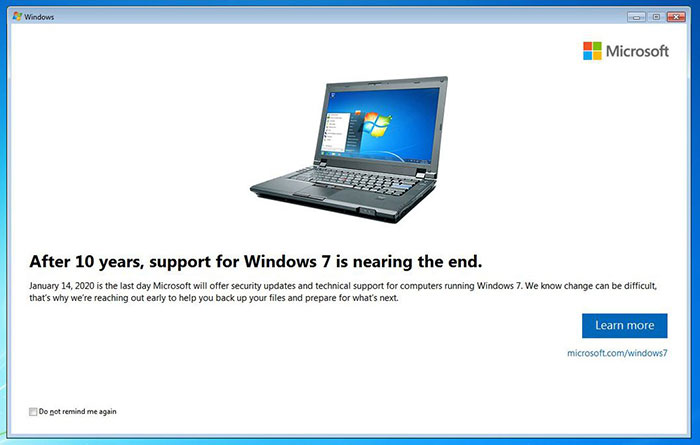Back in April HEXUS reported upon Microsoft's intention to send pop-up notifications to Windows 7 users to remind them that support is "nearing the end". Some Windows 7 users at that time noticed the alert, as reproduced below, which offered four actions; minimise, close, "learn more," and a checkbox for "do not remind me again".
A contemporaneous blog post about 'Making the transition to Windows 10 and Office 365' discussed the reminders. "To help our customers get advanced notice of this change, we are reaching out with information and resources," wrote Windows CVP Matt Barlow on the Windows Blog. "Beginning next month, if you are a Windows 7 customer, you can expect to see a notification appear on your Windows 7 PC. This is a courtesy reminder that you can expect to see a handful of times in 2019."

ComputerWorld notes that Microsoft had indicated that it wouldn't push such nags to users of Windows 7 Pro (and Enterprise). In the support document for KB4493132, which delivered the nag code earlier this year, it said that this alert system would "not install on devices running Professional and Enterprise editions of Windows 7 as well as Windows Server products". Microsoft reasoned that in managed organisations the update was not applicable.
Now Microsoft has updated the blog post originally published back in March with notice that it is extending the nags to Windows 7 Pro users. However, it notes that if your Windows 7 Pro install is "domain-joined as a part of an IT-managed infrastructure," it will not be inflicted with the nag screens. Microsoft recommends that if you have absorbed the nag screen and don't need reminding again, then simply click the check box to the lower left to banish it. It advises against uninstalling the associated KB4493132 or KB4524752 updates as they will be downloaded again the next time the device scans for updates...
Remember, all versions of Windows 7 reach the end of extended support on 14th January next year. However, at the start of this month Microsoft announced a paid-for reprieve for those who are willing, with the Windows 7 Extended Security Updates (ESU) program.













